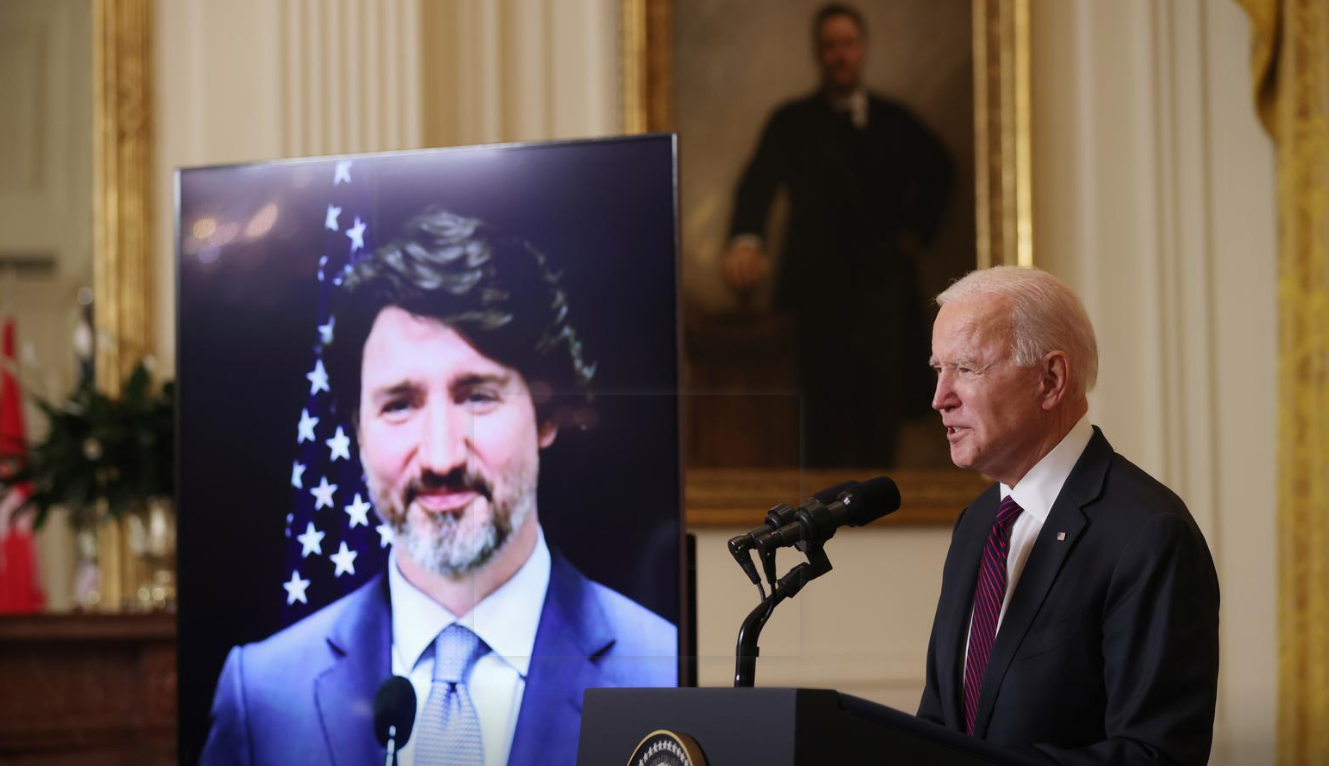U.S. President Joe Biden declared Canada and the United States best friends Tuesday, while Prime Minister Justin Trudeau called the friendship "extraordinary" in a virtual meeting turning the page on the turbulent Donald Trump era.
"The United States has no closer friend than Canada," Biden said, setting the tone for the get-together conducted via video link between the White House and Trudeau's office in Ottawa.
Although COVID-19 restrictions kept the two leaders apart physically, they went out of their way to demonstrate that the giant neighboring countries are back to their traditional closeness after the tension of Trump's "America first" policies.

U.S. President Joe Biden (R) and Canada's Prime Minister Justin Trudeau, appearing via video conference call, give closing remarks at the end of their virtual bilateral meeting from the White House in Washington, U.S., February 23, 2021. /Reuters
U.S. President Joe Biden (R) and Canada's Prime Minister Justin Trudeau, appearing via video conference call, give closing remarks at the end of their virtual bilateral meeting from the White House in Washington, U.S., February 23, 2021. /Reuters
"We have a robust agenda today and we're all best served when the United States and Canada work together and lead together," Biden said in public remarks before heading into closed-door talks.
Repaying the compliment, Trudeau said they would work "together to get through COVID-19 but also to make sure we're pulling our weight around the world and making the world a better and safer place for everyone."
Achieving net zero emissions by 2050
Biden said he and Trudeau agreed to work toward achieving net zero emissions by 2050.
"We're launching a high-level, climate-ambition ministerial and to align our policies and our goals to achieve net zero emissions by 2050," Biden said.
Trudeau thanked Biden, who has put the United States back into the Paris climate accord on reducing global carbon emissions, for his policies on global warming.
"U.S. leadership has been sorely missed over the past, uh, past years," he said.
'Road map' for better ties
The White House is touting that Tuesday's extensive talks will provide a "road map" for better relations.
Trump, who re-categorized Canada and other U.S. allies as competitors, had a sometimes tense personal relationship with Trudeau.
The Republican former president imposed tariffs on Canadian aluminum and steel. He traveled only once to Canada for a G7 meeting in 2018, and blasted Trudeau for being "very dishonest and weak" after he left.
By contrast, Trudeau was the first foreign leader to phone Biden after he won the November election and Trudeau was the first foreign leader the Democrat called after getting into the Oval Office.
The White House emphasized how U.S.-Canada ties play an important role in multilateral settings, from the G7 to NATO, the Five Eyes intelligence alliance and the WTO.
Shared concerns
Biden and Trudeau were addressing several mutual priorities, including climate change, revving up the North American economy, the Arctic and the situations in Myanmar and Venezuela.
"By being on the same line on several subjects, like climate change or economic revival, we can do more together," Trudeau's office said.
One area Biden and Trudeau did not comment on in the public portion of their remarks was the U.S. decision to cancel the permit for the Keystone XL pipeline, a project fiercely opposed by environmentalists but backed by Ottawa and previously by Trump.
Biden rescinded the permit by executive order on his first day in office.
"The president made clear that this is a commitment he's made in the past, that it's not in the interests of the United States and that we want to try to address our climate crisis, while also creating good paying union jobs," White House Press Secretary Jen Psaki said.
(With input from AFP)

